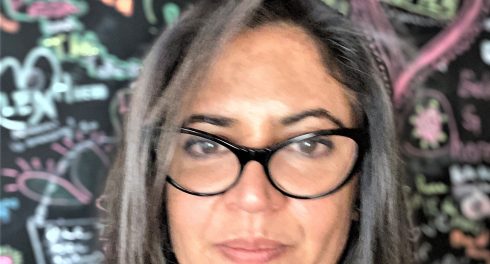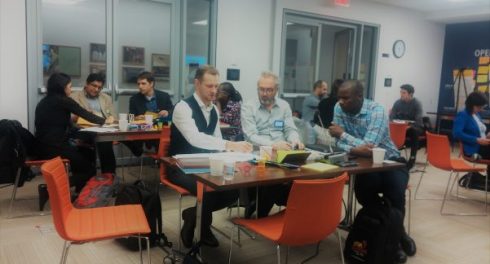Highlight
- Pressing down the press
- Open responses and activist adaptation
- Where next?
- Track the tracker – the latest
- #Shiftthepower – not so easy
- Donor responses, billionaire scrutiny
- TAI Spotlight: Evaluating a donor collaborative
Pressing down the press
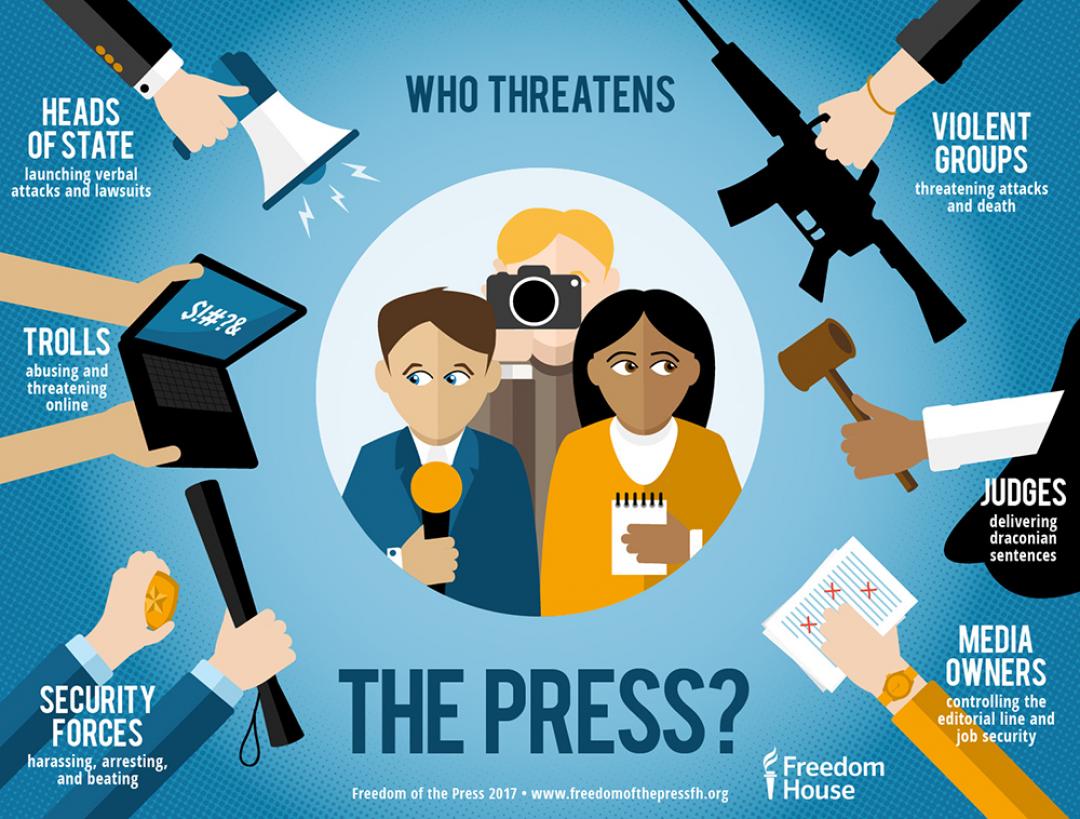
Photo credit: Freedom House
As the world celebrated World Press Freedom Day, some encouraging reminders from the Pew Research Center on how majorities view the importance of a free press in much of the world (check out these charts). Sadly, Africans’ confidence in their media is declining under governments’ squeeze and Jeff Conroy-Krutz worries that democracy cannot survive without independent media. The Press Emblem Campaign reminds us that “transparency is paramount to saving lives in the event of a health crisis” and yet data published by Reporters Without Borders reveal journalists across the world continues to face increased fear and violence.
The coronavirus becomes the exacerbating factor with journalists forced to toe the line or face consequences. See incidents in countries as diverse as the UK, United States, Myanmar, China and Turkey. Repression comes on top of all real health threats – dozens of journalists have lost their lives to the virus in the last two months while trying to provide coverage amid the crisis.
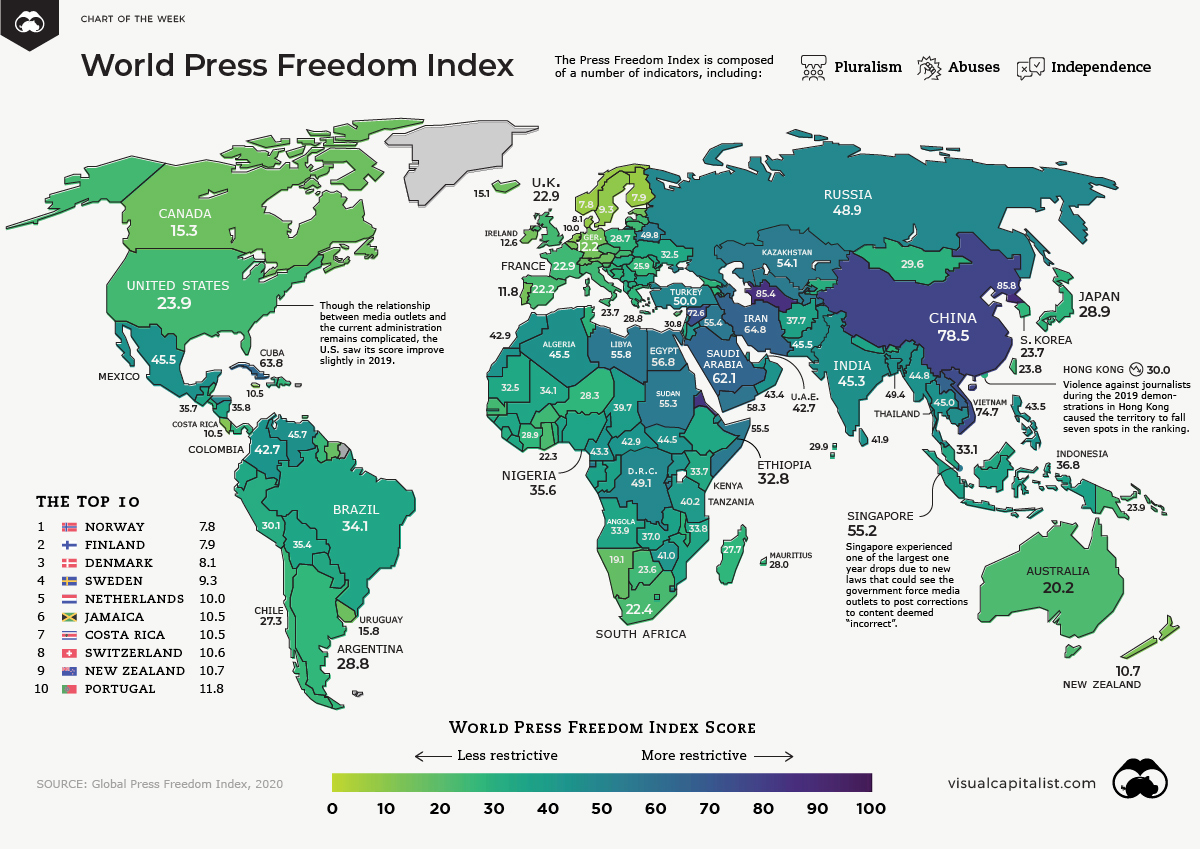
Image credit: Global Press Freedom Index, 2020.
The Reporters Committee for Freedom of the Press takes a sweeping glance at the expansive powers government wield during a health emergency and notes how those powers may impact news gathering and affect press freedoms during the pandemic. CIVICUS’s Aarti Anarsee calls on the EU (where there has been over 100 press freedom violations since COVID-19) to rescue media independence in Hungary. The Council of Europe also has some recommendation on the protection of journalism and media workers.
Open responses and activist adaptation
The cornerstones of the openness agenda are mobilizing to reinforce positive reactions to the pandemic. Open Government Partnership (OGP) launched their Open Response + Open Recovery to ensure transparent, accountable, participatory and inclusive responses to COVID-19 and preparation for recovery and reforms to build more resilient societies post-COVID-19. OGP Deputy CEO, Joseph Powell, tells us why this matters.
Bady Balde and Joanne Jones of the Extractive Industries Transparency Initiative knows keeping transparency on track in the COVID era may be difficult, but share ideas they think can help (and have a nifty chart on data transparency risk by region.)
What of the open budget movement? The International Budget Partnership released their biennial Open Budget Survey findings, now covering an impressive 117 countries. Budget transparency is still on the up, but with much room still to improve – the average transparency score is 45 out of 100 (IBP surmises 61 as the score required to have informed public debate). Watch the presentation of findings and check out the Call to Open Budgets. While the survey was conducted pre-pandemic, the underlying demands for transparency and participation have a renewed urgency and extend to the range of fiscal issues. See the call from Andrew Wainer, Sanjeev Gupta and Mark Plant for governments to consult civil society in decision making to create budget to deal with the health emergency.
How might civic activism influence such debates? Saskia Brechenmacher, Tom Carothers and Richard Youngs map out different dimensions to emergent pandemic-related activism, note the challenge of influencing longer-term policy reform and provide some important reminders to the donor community to support civic action.
Where next?
Looking ahead, Naomi Fowler urges our post-Covid world to finally clamp down on money laundering, while Blair Glencorse pushes for anti-corruption through the G20 civil society engagement process. His argument? Improving the accountability and diversity of the Global C20 civil society Anti-Corruption Working Group (ACWG) process over time is essential, not only to help fight corruption but also to ensure that G20 itself remains credible.
Compliance experts like Gemma Aiolfi are already taking a look at possible challenges and chances of ensuring health and well-being of corporate integrity and anti-corruption compliance in the private sector post-covid-19. More momentum for change from the outcomes sought in the B Team’s new strategy, noting “no trust without transparency and responsibility.”
Transparency International, Human Rights Watch, and Global Witness advise the IMF to include transparency and anti-corruption measures in coronavirus-related emergency relief programs to ensure that the billions of dollars it is disbursing to dozens of countries help the most vulnerable. Meanwhile, tax experts offer a five step public interest test for Covid-related business bailouts. On that front, good news from Canada, the latest to join the mini bandwagon of France, Denmark, and Poland in refusing bailouts for firms with tax haven (see past Weeklys).
United States regulators demand oil giant Eni pay $24.5 million for its role in the “sham contracts” in a Panama bribery case but experts are frustrated at small size of fine. Alexandra Gillies, author of the book: Crude Intentions: How Oil Sector Corruption Contaminates the World, says the fine “seems frustratingly weak when compared to the alleged wrongdoing.” Want more reminders of the consequences of such practices? Brett Carter details the corrupt and repressive realities of Sassou Nguesso regime in oil-rich Republic of Congo.
DFID veteran Phil Mason thinks it’s time to reassess how corruption is curbed and the role of funders in shaping development responses. He believes there is need to redesign weak systems and incentive structures in a corrupt society where malfeasance is incentivized over integrity, and manifests itself as impunity. (Look out for the remaining blogs to come in this ten-part series.)
Essential Watching: Covid-19 and Corruption: Tracking the trillions
Watch this panel on how corruption will affect the response to COVID-19 and how critical beneficial ownership data is to ensuring that we don’t lose critical funds to bad actors. “Just being able to check who you have given the money too – the beneficial ownership – is incredibly powerful, perhaps #1 check you need to make (under procurement)”, says John Penrose MP, the UK government Anti-Corruption Champion.
Track the trackers – the latest
Wondering how governments are responding to Covid-19? So many sources. Here are a few of the latest: i) the Skoll community resources on COVID-19 global response efforts, ii) Oxford University coronavirus government response tracker which tracks and compares government policies and fiscal measures globally, iii) the IMF policy responses to COVID-19 tracker summarizing key economic responses governments in 193 countries, iv) the Green Equitable Stimulus plan tracker of proposed and/or implemented economic recovery, equity, and climate responses to COVID-19 around the world.
#Shiftthepower – not so easy
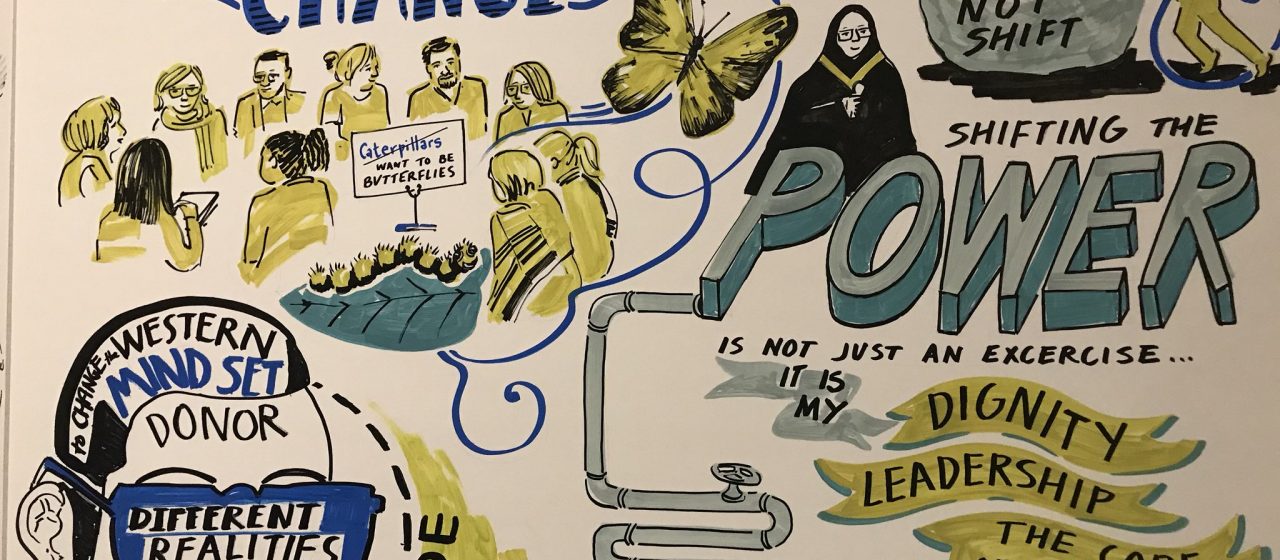
Image credit: Oxfam blog
An interesting working paper from Tara F. Deubel and Micah Boyer sheds more light on the relationship between women’s economic empowerment and forms of political engagement and accountability. Annemarie Samuels and Sarah Giest note data gaps in policymaking pertaining to minority groups and Egídio Chaimite and Lúcio Posse highlight how gender stereotype excludes women in Mozambique, particularly in rural communities.
West Africa Civil Society Institute (WACSI) Executive Director, Nana Afadzinu advocates for a strengthened local-led development and balance of power within the development space. Similarly, EPIC Africa laments that African CSOs are often on the front lines of development in Africa, yet little is known about them. They argued that “Invisibility and fragmentation prevent civil society organizations from connecting with each other, learning from one another, and leveraging the benefits of networks and collaborations, such as pooled resources and joint fundraising.”
TAI joined a discussion of study design for social accountability research last week for which Accountability Research Center (ARC)’s new policy briefing was well-timed. It covers citizen engagement in World Bank projects in Mozambique, Myanmar, Nigeria and Pakistan, suggesting project design continues to fall short if we want more accountability to the public.
Essential Learning: Evaluation during crisis: COVID-19
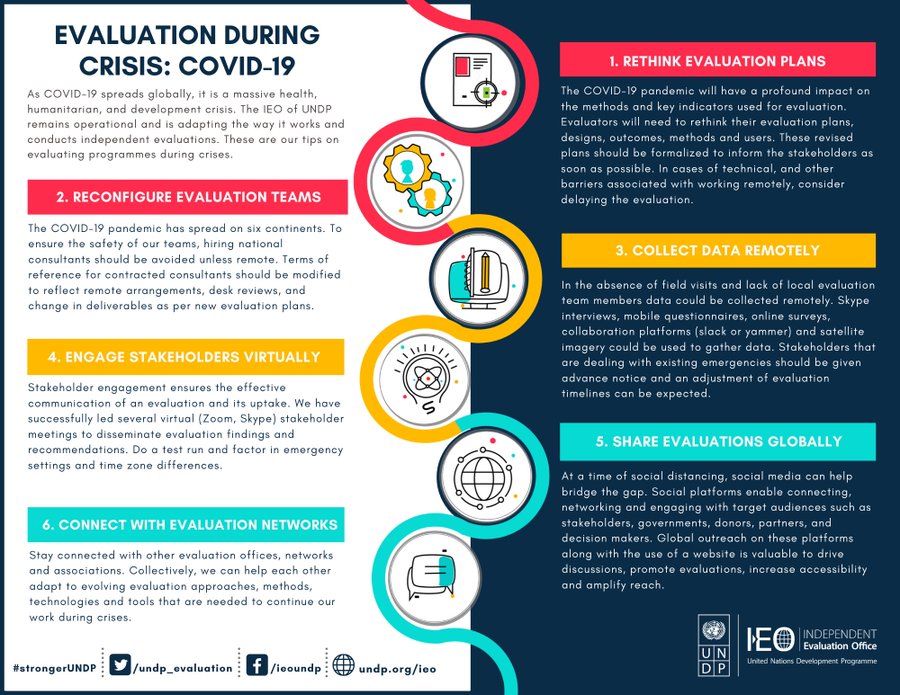
Image credit: UNDP Independent Evaluation Office
COVID-19 is changing the way we work. UNDP’s Independent Evaluation Office team shares tips on evaluating during a crisis, while Jara Dean Coffey, Director of the Equitable Evaluation Initiative (EEI), explores the nuances and conflict we often face in navigating own identities and experiences with privilege and power. Invitation to share thoughts on equitable society and evaluation work here to guide EEI work going forward.
Feedback loops don’t stop with social distancing. Kalyn Livernois share tips for improving your feedback practice during COVID-19. Aspen Institute’s Krystle Starvis and Jessica Leacher also shared a brief guide for ensuring diversity, equity, and inclusions are centered in meetings and events online.
What does it mean to foster resilience? Fay Twersky ponders over what it means to be resilient, especially in a time of major disruption. In support of field resilience, a helpful recap of resources on the funder’s role in strengthening field relationships, giving flexible and reliable funding, building organizational and learning capacity, and collaborative practices funders can take.
Donor responses, billionaire scrutiny
The Center for Effective Philanthropy also has a new rapid-response grantee feedback tool that aims to help foundations better understand and support the pressing needs of their grantees in COVID-19 context. Want an immediate sense of what it means to do grassroots work right now? The Movement for Community Led Development brainstormed with some 98 practitioners from around the world on barriers, resources, and adaptations to Covid-19. Conversation covered community access (move from “social distancing” to “physical distancing”); convening (considering location-specific needs and language), procurement and service delivery (implications of community health and other service delivery workers); shifting priorities (risks of moving to covid-19 only responses and away from cross-sector or systems responses).
Here is also a reminder of how philanthropies have responded to COVID-19 and how the biggest twenty-five grantmakers have given to end the pandemic.
Finally, a Global Citizen survey of almost 27,000 people in 25 countries reveals majority (8 out of 10) want billionaires to do more to fight poverty, inequality, and help global development. Ana Conner at Third Wave Fund breaks down how big-money philanthropy works and explains how big philanthropy should do more to tackle inequality. Bottom line: “Let us come out of this ensuring that the organizations building the world we desperately need haven’t had to close because philanthropy tightened its belt.”
Essential Read: TAI Evaluation Brief

We have published our evaluation brief as a more digestible version of our full evaluation for general audiences, already sparking interest from other donor groups. We are pleased to learn of our challenges and successes through this evaluation, including the different ways TAI offers value to its members.
TAI Spotlight: Evaluating a donor collaborative
Evaluating a donor collaborative | Transparency and Accountability Initiative
In the first of two blogs, TAI’s Head of Learning and Impact, Alison Miranda discusses what motivated TAI to commission an external evaluation and insights from the process. You can read a summary of the main evaluation findings and learnings in TAI’s evaluation brief.
How do we know if we’re making progress? | Hewlett Foundation
Hewlett Foundation’s Transparency, Participation and Accountability (TPA) team reflects on some of the implementation markers of their strategy and how the current COVID-19 pandemic reminds us why we ought to be humble when we forecast about the future. They foresee next year’s implementation markers could more of a challenge to formulate and prioritize amidst such uncertainty. If you have any suggestions (or questions) or if you have plans for a strategy, program, or project evaluation that you would like to share, Hewlett TPA team will like to hear from you.
DFID technical competency frameworks | DFID
DFID has updated its list of core competencies for advisers that set out the skills and attributes that make up each competence. The UK will also virtually co-host new Coronavirus Global Response Summit next week on 4 May 2020.
In Covid-19 crisis, philanthropy’s attention must focus on People with disabilities | Ford Foundation
Ford Foundation President, Darren Walker and the President of Robert Wood Johnson Foundation, Rich Besser advocates for disability inclusion during the pandemic. The duo says “people with disabilities are in danger of suffering the consequences of our society’s collective inaction. We in philanthropy must work with people with disabilities to uphold their civil rights and ensure equal access to vital health care, resources, and support during this crisis.”
Roma in the COVID-19 crisis | Open Society Foundations
Roma communities in Europe face a higher risk of death from COVID-19. This brief argues that the COVID-19 crisis and the EU’s recovery plan in response both present an opportunity to improve the conditions of Europe’s Roma—not only in terms of rights, obligations, needs, but in the interests of sound political and economic decision-making across the region.
The Top 100 Respond to COVID-19 | MacArthur Foundation
Managing Director of 100&Change and CEO of Lever for Change, Cecilia Conrad, shares a snapshot of how the Top 100 in MacArthur’s 100&Change applicants are responding to the COVID-19 outbreak.
Enabling Media Markets to Work for Democracy | Luminate
Just as the need for independent public service media is proven, declining advertising revenues and rising cost of independent journalism is affecting media enterprises. Luminate funded the International Fund for Public Interest Media report to advocate for the need to fix the current broken business model of media.
Calls and job listings
Job postings at Ford Foundation – Ongoing
Job postings at Luminate – Ongoing
BetterTogether Challenge for innovators – Ongoing
Job postings at Democracy fund – Ongoing
Free Digital Security Training – Ongoing
Open Road Alliance Charitable Grant and Loan to organizations responding directly to COVID-19 – Ongoing
Pulitzer Center Coronavirus news collaboration challenge – Applications will be reviewed on a first-come, rolling basis
Call for proposals: Informality, tax, and the state – Proposals accepted on a rolling basis
Call for suggestions on humanitarian and development data forum agenda – May 2020
On Think Tanks survey to capture effects of COVID-19 on global think tanks – May 8
Creatives needed for exciting animation project – May 10, 2020
Call for Projects Paris Peace Forum 2020 – May 12, 2020
Research opportunity – Enabling and inspiring duty-bearers to act with integrity – May 17, 2020
Research opportunity – Achieving positive solutions to citizen-identified problems with service delivery – May 17, 2020
Media integrity contest for South Africans – May 19, 2020
Summer school for journalists open for Russian citizens – May 20, 2020
Call for applications: Intensive anti-corruption training for future leaders – May 20, 2020
Lead Researcher at ICTD DIGITAX programme – May 24, 2020
Policy and engagement consultant at ICTD DIGITAX programme – May 24, 2020
Rapid-Response Grants on Covid-19 and the Social Sciences – June 1, 2020
Proposal submission for the 2020 Summer Evaluation Institute – June 7-10, 2020
Marielle Franco Award for feminist essays 2020 – June 16, 2020
Open call for grants funding on social accountability and transparency in the national education sector – June 19, 2020
IBM call for Code Covid-19 Global Challenge – July 31, 2020
Amartya Sen essay contest 2020: Illicit financial flows – August 31, 2020
Call for submissions to SSIR Series: Social change in an era of extreme polarization – Last Thursday of every month until early 2021
Calendar
Please double check the websites for these events to make sure they are still happening – many are subject to change due to the spread of coronavirus.
Transparency International: 19th International Anti-Corruption Conference – (Postponed)
Dart Center webinar series on COVID-19 reporting (Running till 30 April)
How to respond to COVID-19 through open government (Part of the Open Response + Open Recovery series) – May 5, 2020 (7am-8am EDT/12pm-1pm BST)
Strengthening transparency and accountability in budgeting and contracting – May 5, 2020 (10:00 ET/14:00 GMT)
2020 Collective Impact Virtual Convening – May 6 – 8 2020 (12:00 CDT)
Global Digital Development Forum May 6, 2020 6AM-10P GMT
Webinar: Time for a Selfie: Evaluation Capacity building for Funders – May 6, 2020 (1:00 – 2:00 PM EST)
Open service delivery in health – Communities and governments working together – May 6, 8:00 ET/12:00 GMT
Keeping information and data out of lockdown – May 6, 2020 (15:00 ET, 19:00 GMT)
Access to justice and open government during a pandemic – May 7, 2020 (8:00 ET/12:00 GMT)
Open government and digital governance in the time of COVID19 – May 7, 2020 (10:00 ET, 14:00 GMT)
Frontiers of Social Innovation: People, Power & Resources: The Redistribution Wave – May 12-14, 2020 (Stanford University, California, USA)
Fundraising in a crisis: focus on donors most likely to give —May 14, 2020
Donor advised funds and their critics: Do DAFs help or hurt philanthropy? – May 14, 2020 (11:30AM – 1:00PM PDT)
2020 Data Foundation virtual symposium – May 20, 2020 (10:00 AM – 2:30 PM EDT)
2020 Media Impact Forum (funder-only gathering) – June 2, 2020 (New York, United States of America)
Human Rights Litigation Summer School at Berlin, Germany – June 8-12, 2020
Women and Girls Africa Summit – June 9-12, 2020 (Durban, South Africa)
RightsCon 2020 – June 9-12, 2020 (San Jose, Costa Rica)
2020 Neighborhood Funders Group National Convening (philanthropy support to grassroots power building) – June 29 – July 1, 2020 (Washington, DC)
WE EMpower UN SDG Challenge 2020 – September 18 – 27, 2020 (New York City, United States of America)
The 2020 Journalism Funders Gathering (funder-only gathering) – October 6-7, 2020 (Philadelphia, United States of America)
Humanitarian and Development Data Forum – November 2-4, 2020 (Chambery, France)
International Open Data Conference –November 18-20, 2020 (Nairobi, Kenya).
